Cape Fear (1962)
Universal Home Video
Cast: Robert Mitchum, Gregory Peck, Martin Balsam, Polly Bergen
Extras: Documentary, Theatrical Trailer, Production Photographs, Cast and filmmakers notes, DVD-ROM Features
Rating:
Perhaps the most interesting observation after watching the 1962 thriller ’Cape Fear’ is that Martin Scorsese’s 1991 remake compliment each other, fleshing out themes but still respecting the inspiration. Universal Home Video has just released the first ’Cape Fear’ on DVD with a few supplements. While the plot too often smacks of American white-collar wholesomeness threatened by beer guzzling evil, the film contains a number of juicy suspense moments.
Robert Mitchum plays Max Cady, an ex-con fresh out of prison and slowly insinuating himself into the placid life of lawyer Sam Bowden (Gregory Peck), who testified against Cady eight years earlier. Cady has returned to not only settle his grudge with Bowden, but target his dutiful wife Peggy (Polly Bergen) and nearly adolescent daughter Nancy (Lori Martin) as well. Now fully versed in the law and its frustrating technicalities, Cady exerts virtually free reign in terrorizing his Inspector Javert. With Cady stepping up his increasingly menacing actions. Bowden and the family head for Cape Fear River in hopes of forcing Cady into making his final, perhaps deadly, move.
Directed by action specialist J. Lee Thompson, ’Cape Fear’ juggles the cat-and-mouse elements of James R. Webb’s script (adapted from a John D. MacDonald novel) efficiently without making it too mechanical. Having headliners as Mitchum and Peck as well as a solid supporting cast gives sufficient weight to the essentially pulp premise. What the first version lacked, and what the Scorsese interpretation corrected, was ambiguity within the characters. Bowden and his family are almost unbearably pure, Cady a leering psycho with a grudge over getting caught. In the remake, Nick Nolte’s Bowden invokes the ire of Robert DeNiro’s Cady for compromising his defense at a rape trial. Still, Thompson manages a few zingers like Cady smearing raw egg over Peggy’s breast or the tight close-ups on Nancy’s face when confronted by her predator. Thompson’s understated approach favored suggestion rather than overt violence, partly to appease censors at the time.
The 1.85:1 anamorphic transfer does justice to Samuel Leavitt’s black and white cinematography. The image exhibits a high degree of detail, with good gray tones and deep blacks. The source print is practically spotless. Detail delineation and contrast are excellent, with shadows solidly black when necessary. Aside from occasional edge enhancement, the picture shows no compression or digital artifacts.
The Dolby Digital audio replicates the mono soundtrack according to its age. Bernard Herrmann’s incisive music, dialogue and sound effects come through clearly without hiss or crackles. The only time the audio sounded harsh was when the music reached into the higher frequencies.
Leading the extras is ’The Making of ‘Cape Fear’,’ an engaging retrospective documentary from producer Laurent Bouzereau. The half-hour look back features new video interviews with Peck and Thompson. Both reminisce about the production, co-stars, censor battles and Scorsese’s remake with surprising candor and affection. A full screen theatrical trailer, photo gallery, cast and production notes round out the special features.
Universal has produced a respectful and thoughtful DVD of the original ’Cape Fear.’ Highly recommended for suspense fans and those who enjoyed the Scorsese remake. According to the documentary, Lee and Peck liked it too.







